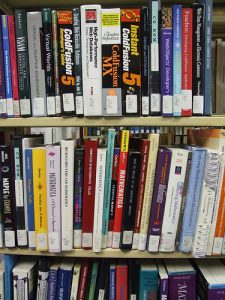By Sean D. Evans (Blogger)
Email: onlineeditor at ufvcascade dot ca
 As I have pursued what some call higher education, it has become apparent to me that many have vastly different motives for seeking knowledge. A History Professor once told me that he studies the past because he thinks it’s “interesting”, refusing to admit any pragmatic value to studying the past. History had been neutered in his classroom.
As I have pursued what some call higher education, it has become apparent to me that many have vastly different motives for seeking knowledge. A History Professor once told me that he studies the past because he thinks it’s “interesting”, refusing to admit any pragmatic value to studying the past. History had been neutered in his classroom.
This was difficult for me to understand. Why would I study something if I didn’t expect it to change me?
I believe it comes down to fear. Many, including myself, fear that the search for truth—education, really—will require us to reconcile preconceived notions with new knowledge. We often find that what we believe doesn’t correspond with reality. Whatever fails to correspond with reality is not true, or to put it positively, truth must correspond to reality. We again step back to the drawing board. This is uncomfortable work.
Yes. I said it. It requires work. It requires that we step down from our ivory towers of higher education and get our hands dirty. This is what I hope this blog, this conversation, will grow into.
Let us engage with reality. Let us engage with our thoughts. Let us think. Let us argue. Let us ponder. Let us imagine. Let us wonder. The world around us is buzzing. It is ready and waiting for us to revel in it. Have you ever been absolutely taken aback the fact that we even exist? It is a ridiculous notion, to be sure.
I hope this will be a venue for us, in some measure, to get our hands dirty and examine what we actually believe. Belief requires action; it demands that we submit to the consequences. What you think about life matters—it affects the way you live and view the world around you. This is about much more than just a degree or a grade. It is about life, love, politics, religion, atheism, history, anthropology, faith, worldviews, sex, hope, failure, identity, science and education. I like to call it higher education.
“It seems that the ideas with the most profound consequences are frequently taken for granted. They are ideas that lie just behind conscious thought, providing a kind of foundation for the deliberations of everyday life. They are the ideas that define ‘the way things are’ and demarcate the possibilities of life. Indeed, the more consequential an idea is, the more likely that it is deeply embedded in institutions and traditions and habits of thought. This is why the most important ideas are often the most difficult to weigh and to reflect upon.”
~ Craig M. Gay, The Way of the (Modern) World: Or, Why It’s Tempting to Live As If God Doesn’t Exist (Grand Rapids, Mi.: Eermans, 1998). 1.
Will you join me in examining the deeply embedded ideas and concepts that shape our lives? This challenging, rewarding and slightly unnerving task awaits us.


